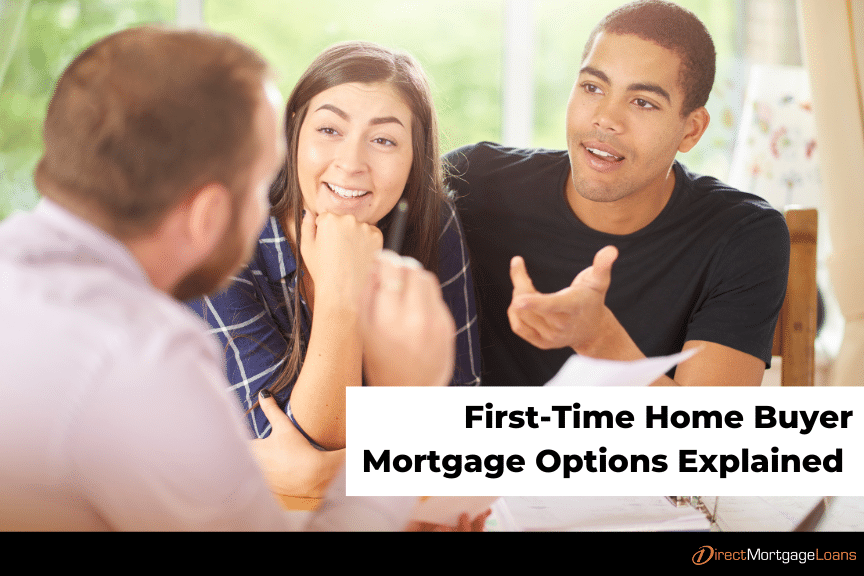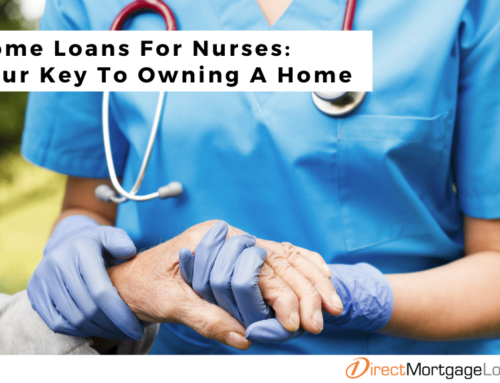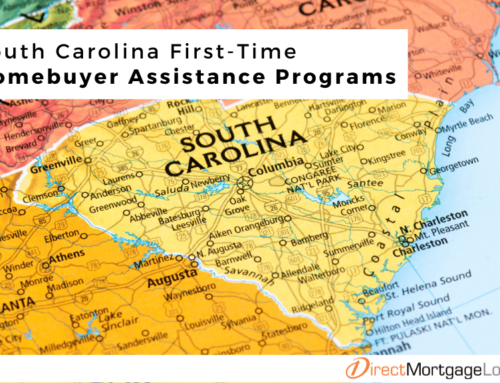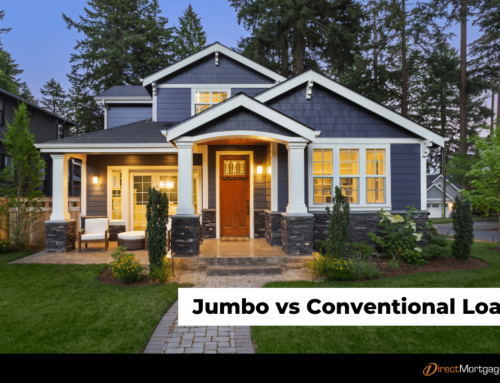What is the best option for first-time home buyers?
The best mortgage option for first-time homebuyers depends on their individual financial situation and goals. Nonetheless, the most popular loan options for first-time homebuyers include conventional, FHA, USDA, VA, and Specialty loans. Keep reading to learn which loan option is best for you!
Conventional Loans
This is a type of conforming loan, meaning that it meets the conventional loan requirements for a Fannie Mae or Freddie Mac loan, though it is not backed by the government, which makes it simpler to comply with these loans. Typically viewed as the 20% down mortgage solution, conventional loans come in all shapes and sizes.
For first-time home buyers, the minimum down payment may be as low as 3%, but this depends on factors such as credit score, loan amount, and eligibility for a conventional loan. Additionally, unlike government-backed loan options like FHA and USDA, conventional loans offer flexibility with mortgage insurance. If you put down 20% or more on your purchase, then mortgage insurance is not required.
Furthermore, conventional loans offer affordable housing programs that allow borrowers to purchase a home with a down payment as low as 3%. These programs include Fannie Mae HomeReady and Freddie Mac Home Possible, which provide opportunities for borrowers to access affordable mortgage options and achieve their dream of homeownership.
FHA Loans
These loans are governed by the Housing of Urban Development (HUD) and offer flexible guidelines for borrowers with limited down payment funds and an imperfect credit history. Since FHA loans require lower credit scores and down payments, they may be popular among first-time home buyers. If you have a lower credit score and don’t qualify for a conventional loan, then FHA loans could be an excellent option for you. With an FHA loan, you could qualify for a mortgage with a credit score as low as 500, although a score of 580 or higher is generally required to qualify for the lowest down payment option.
Another advantage of FHA loans is that they require a down payment of only 3.5%, which is significantly lower than the 5% to 20% required for most conventional loans. This makes homeownership more accessible, especially if you don’t have a large down payment saved. In addition, this type of loan is more forgiving of high debt-to-income ratios than conventional loans. This means that if you have a lot of debt relative to your income, an FHA loan could be a good option.
However, it’s important to note that FHA loans require borrowers to pay for mortgage insurance premiums (MIP) to protect the lender if the borrower defaults on the loan. This is an additional cost that you should consider when deciding on a mortgage loan. The MIP can be paid upfront as part of the closing costs or can be included in the monthly mortgage payments. Overall, it’s always a good idea to speak with your loan officer to evaluate all your options before deciding.
USDA Loans
Designed to assist low-to-moderate-income borrowers in rural areas to purchase a home. These loans offer flexible guidelines and require no down payment. They are government-insured and can only be used for purchasing a home in a designated rural area. USDA loans are a helpful option for those who have limited funds for a down payment and wish to buy a home in a rural area.
One of the most attractive features of a USDA mortgage loan is that no down payment is required. This can make it easier for those with limited savings to purchase a home. Additionally, these mortgage loans typically offer lower interest rates than conventional loans, which can result in significant savings over the life of the loan.
Although, like other government-backed loans, USDA mortgage loans require borrowers to pay mortgage insurance premiums; However, these premiums are typically lower than those required for FHA loans. USDA mortgage loans also require borrowers to pay a funding fee at closing. This fee helps offset the cost of the program and can be financed as part of the loan.
VA Loans
A VA loan is a flexible, $0-down payment mortgage loan option, partially backed by the Department of Veterans Affairs. People utilize VA loans to purchase a primary property or refinance an already existing mortgage.
One of the main benefits of a VA Loan is that applicants can borrow as much as a lender is willing to lend without having to put any money down, while other loans like FHA loans require a minimum down payment of 3.5%. Additionally, VA loans never require private mortgage insurance, even if there is a 0% down payment.
Moreover, the Department of Veterans Affairs does not set a minimum credit score for loans guaranteed by the department, allowing lenders to consider the full profile of the applicant. This is different from other loans where qualification is based on minimum credit score requirements. Furthermore, VA loans do not have prepayment penalties, allowing borrowers to pay off their mortgage early or make extra payments without being charged, which can help save money in the long run.
Specialty Loans
These are types of mortgages personalized to fit the specific needs of the borrower. These home loans are designed to help home buyers with unique or special circumstances that may not qualify for a standard home loan. Here are just a few of the most popular programs that Direct Mortgage Loans offers.
- Good Neighbor Next Door: The Good Neighbor Next Door loan program offers qualified professionals housing incentives while contributing to community revitalization. By purchasing an eligible property, a qualified home buyer is offered a 50% discount from the listing price of the home.
- Fannie Mae Homeready/ Freddie Mac Home Possible Advantage Loan: Designed for the creditworthy, low-to-moderate income borrower, with limited down payment funds, HomeReady and Home Possible provide home financing options with up to 97% financing, or a down payment as low as 3%.
- Non-QM Loans: Non-QM loans are a type of alternative mortgage loan that is designed for borrowers who do not meet the typical requirements of a conventional loan. These loans are typically used by borrowers who are self-employed, have non-traditional forms of income, have a low credit score, or cannot provide the necessary documentation for a conventional loan.
Which loan is best for first-time home buyers?
When it comes to home loans there is “no -one-size-fits-all” mortgage. First-time home buyers should first complete an application and have a conversation over home buying goals with their loan officer. Then, the loan officer will be able to determine the best loan option for you based on your specific financial situation and home-buying goals.
If down payment funds are the challenge holding you back from your home purchase, consider asking your Direct Mortgage Loans Loan Officer about Down Payment Assistance Programs. These programs aid home buyers by providing grants, or loans, to reduce the amount needed for a down payment. In some cases, down payment assistance programs may cover closing costs too. There are specific requirements to be eligible for these programs, and different DPA programs have varying requirements and lenders that they work with.
- Loans: Loans are second mortgages that a borrower will pay back monthly, along with the primary mortgage.
- Grants: Grants are essentially gifted money towards the down payment that never needs to be repaid.
- Deferred Loans: Deferred loans are also second mortgages; however, they have deferred payments. Therefore, this second mortgage must be repaid when the borrower moves, sells, or refinances their home.
- Forgivable Loans: Forgivable loans are second mortgages that are forgiven for many years (anywhere from five to twenty years). This mortgage only gets repaid if you move, sell, or refinance before reaching the period of forgivable time. For example, if you agree to a 5-year forgivable loan, but sell the house during year 3, you will need to repay the down payment assistance amount.
There are over 2,000 DPA programs worldwide. Work with a loan officer to find the right DPA programs for you!
What credit score do you need to buy a house?
Your credit score is a number ranging from 300 to 850 (the higher, the better). This number indicates how “creditworthy” you are, and in the eyes of potential lenders, how reliable you are to repay your loan punctually. Factors like your payment history, the amount owed, new credit, length of credit history, and types of credit determine your numeric score. The credit score needed to buy a house will depend on the type of loan you choose. Here are the general credit score requirements, but keep in mind this may vary!
- Conventional Loan: For this type of loan, it is ideal to have a high credit score (740 or higher). A 620 or higher credit score is recommended for application. It is technically possible to obtain a conventional loan with a lower score, however, a higher interest rate may be offered.
- FHA Loan: With a minimum credit score requirement of about 580, this option is best for those who have a lower credit score or may not have much saved for a hefty down payment.
- VA Loans: This type of loan is only available to those who are a veteran or qualified service members/spouses. If you meet these requirements, this loan has advantages such as no required down payment and no set minimum credit score.
- USDA Loan: These are applicable to those who live in a rural or suburban area with an income below 115% of the area’s median. This loan is backed by the government and requires a credit score of around 640.
Is it worth getting an FHA loan?
An FHA Loan is a government-backed mortgage which means it may be more accessible to those who may not be in a perfect position to buy. However, it’s important to consider both the advantages and disadvantages associated with this type of loan before deciding if this option is right for you.
Advantages
- Lower down payment requirements compared to a conventional mortgage.
- Lower credit score requirements.
- Higher loan limits in certain areas.
- Better interest rates for lower credit scores (compared to a conventional loan with similar credit history).
- This may allow for a higher debt-to-income ratio.
- May allow for a higher loan amount compared to a conventional loan.
Disadvantages
- Mortgage insurance premiums (MIP) are required for the life of the loan.
- Private mortgage insurance (PMI) for the life of the loan if you put down less than 10%. If you put down more than 10% there is a graded scale.
- There are loan limits that may impact how much you can borrow.
- You may need to meet certain income requirements to qualify.
- You may need to provide additional documentation, such as tax returns.
Keep in mind that these pros and cons may vary depending on your specific financial situation and the FHA lender you choose. It’s important to do your research and weigh the pros and cons carefully before deciding whether an FHA loan is right for you.
What are the 3 types of mortgages?
The three types of mortgages available include fixed-rate mortgages, adjustable-rate mortgages, and government-insured mortgages.
- A fixed-rate mortgage simply means the home loan has a set rate for the entire term of the loan. The most common fixed-rate mortgages are 15-year and 30-year loans. While both of their interest rates are fixed over their lifetimes, they each offer different advantages and disadvantages for homebuyers.
- An adjustable-rate mortgage (ARM) is a type of mortgage where the interest rate fluctuates periodically based on market conditions. Unlike a fixed-rate mortgage, which has a set interest rate for the life of the loan, an ARM interest rate can go up or down, depending on the terms of the loan.
- Government-insured mortgages include loans backed by the Federal Housing Administration (FHA) and the Department of Veterans Affairs (VA). These loans typically offer lower down payment requirements and more lenient credit score requirements, but they may also have additional fees and insurance requirements.
Connect With A Loan Officer To Learn More
Based on 30 year fixed rate loans. Loans are subject to Eligibility. Eligibility and approval is subject to completion of an application and verification of home ownership, occupancy, title, income, employment, credit, home value, collateral, Veteran status and underwriting requirements. Direct Mortgage Loans, LLC NMLS ID# is 832799 (www.nmlsconsumeraccess.org). Direct Mortgage Loans, LLC office is located at 11011 McCormick Rd Suite 400 Hunt Valley, MD 21031. Equal housing lender.






Leave A Comment
You must be logged in to post a comment.